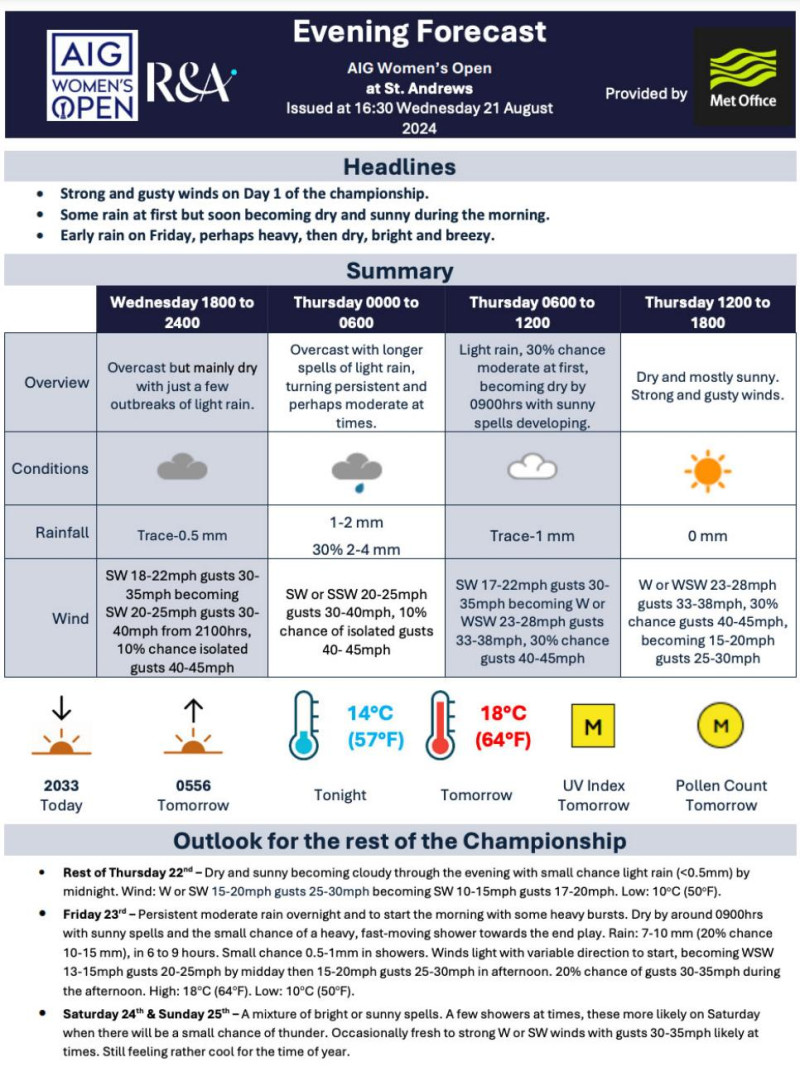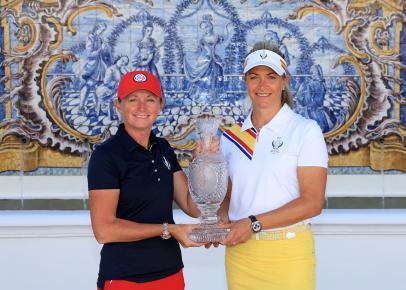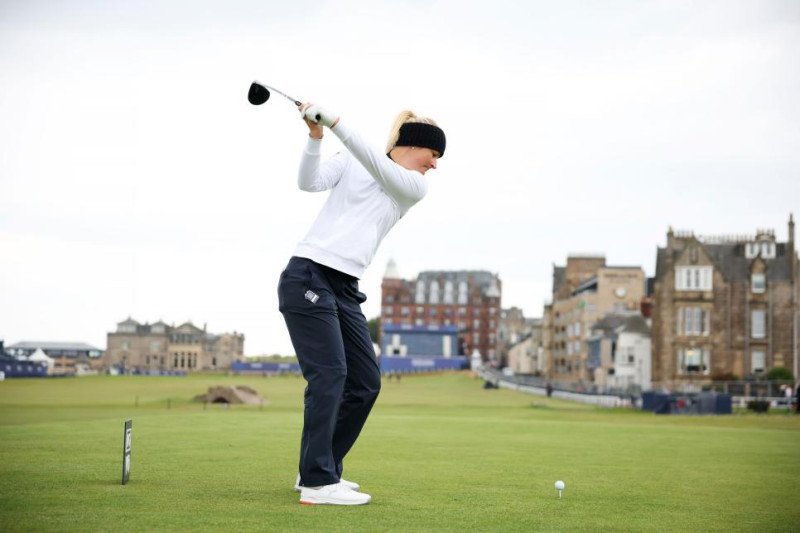ST. ANDREWS, Scotland — Even by Scottish standards, where summer can sometimes best be described as “Wednesday afternoon between 2 p.m. and 3,” it’s expected to get nasty at this week’s AIG Women’s British Open over the Old Course at St. Andrews. Almost everyone agrees. Weather forecasts for northeast Fife have attained an unusual unanimity in a land where, if you don’t like the weather, locals often tell you just to “wait five minutes.” So it is that heavy bouts of rain and winds gusting to anything between 40-60 miles per hour are more than likely to plague the final women’s major championship of the year.
Given that armageddon-like forecast, the R&A is taking precautions while chief executive Martin Slumbers conceded during his pre-championship press conference on Wednesday that delays in play are a real possibility.
“We have slowed the golf course down quite a bit,” said the soon-to-be retiring Slumbers. “We've raised the height of cut on the greens. We've put a bit of water on them to help them grow a little bit. We've got some pretty good ideas about where we can put the pins to actually protect it as much as we possibly can. Most importantly, we will set it up in a way that the players can play. The good news is the wind is forecast all four days to come from pretty much the same quadrant, so we know where we can put the pins to give them some room.
“There is a risk that we'll have delays in play [Thursday], but we'll deal with that. I think the best players in the world want a bit of a hard challenge. I just hope it doesn't blow so hard that we can't play.”

Knowing and fearing the worst, players have understandably been adjusting their normal pre-tournament preparations. There is, for example, little value in practicing the high, soft wedge in conditions where the low punch is absolutely going to be more successful.
“We had so much wind last week in the Scottish Open, I’ve already had a lot of practice,” said Ashleigh Buhai, winner of the Women’s British at Muirfield two years ago. “I struggled a little bit with hitting the ball lower. So I’ve made an adjustment to my set-up for that. It’s all about getting the ball-flight right. And ‘picking’ the wind correctly. The first key is choosing the club that will eliminate spin as much as possible. That’s hard in crosswinds, which we get a lot here. Straight downwind and into the wind is more straightforward.”
More From Golf Digest
 The top 25 players competing at the 2023 AIG Women's British Open, ranked
The top 25 players competing at the 2023 AIG Women's British Open, ranked
 Course Strategy
The Old Course is ready to play its glorious best this week at the AIG Women's Open. Here's why
Course Strategy
The Old Course is ready to play its glorious best this week at the AIG Women's Open. Here's why
 solheim cup
Decisions, decisions: Here’s where we stand with a week remaining in the respective Solheim Cup races
solheim cup
Decisions, decisions: Here’s where we stand with a week remaining in the respective Solheim Cup races
Expecting a challenge, Buhai acknowledged there’s some fun in the process of figuring out a practical way to get around the course.
“I’ve also always enjoyed hitting the little ‘in-between’ shots you need on every links,” she said. “I like to think of myself as a creative player, and my coach has always insisted I learn a range of shots. So I have them in my bag if I need them.”
Not everyone is so content, however. Stacy Lewis, who claimed this title in 2013, the last time it was contested over the world’s most famous course, has been working on shots that would not be required in what might be termed “normal conditions.” Perhaps it’s out of reflex; in 2013, the third round was stopped mid-day Saturday due to high winds, with the leaders needing to play 36 holes on Sunday to finish.
“I was talking to my caddie from the 2008 Curtis Cup here,” said Lewis, who went 5-0-0 16 years ago in the biennial contest between the best female amateurs from Great Britain & Ireland and the United States. “He was telling me he was throwing balls maybe 30 yards off greens. His player couldn’t figure out what he was doing. Until he told her that was where her shots could finish when the wind starts blowing. There was no wind on Monday, and everyone was chipping from four or five yards off the greens. But that ain’t going to happen when it gets windy. So I’ve been spending time playing the course I’m going to play two days from now. There’s going to be a lot of trying to turn three shots into two from 60 yards or so.”

While some players are changing routines to prepare for specific shots, 2021 champion Anna Nordqvist is trying to conserve energy knowing the early rounds will be tiring.
Ross Parker/R&A
Achieving that aim is inevitably going to mean holing out from six to eight feet for par. It’s a safe bet that the winner on Sunday evening will have converted those vital putts more often than not.
“I’ve done a lot of work on my long-putting, both on and off the greens,” says 2009 champion Catriona Matthew. “The surfaces are slow compared with normal tour standards, about 9.7 on the Stimpmeter I hear. And I know the 11th green, which has the most slope, has been watered a bit more than normal. So it makes sense to assume there will be a lot of lag-putting to be done. And in windy weather like we are facing, that also means having to hole out consistently for par.”
Indeed, often overlooked in windy conditions is the havoc that can ensue when the balls, clubs and players themselves are wobbling in the breeze.
“Putting is always tough in the wind,” Buhai agreed. “I focus on making solid contact. That’s crucial. But I’m not one of those who adjusts my set-up or widens my stance though. I tend to play around with my grip pressure. When the greens are slower, I grip a little more firmly.”
Not everyone is bringing a hard-working attitude to the week ahead though. Anna Nordqvist, the 2021 champion at Carnoustie, is one who, having played 72 holes in last week’s Scottish Open at a windy Dundonald Links, is adopting more of a laissez-faire approach.
“I’ve been focusing on my rest,” said the Swede with a smile. “The weather was awful last week, and I got here tired. And I was even more tired after 18 holes on Monday morning. So what I have changed is my schedule, although what hasn’t altered is me trying not to worry too much about what I can’t control.”
One last thing. Asked for her “best advice,” Matthew kept things simple:
“Don’t try to hit the ball too hard. That just leads to too much spin. So ‘chippy’ shots are called for. Take at least one more club and hit easier is the way to go.”